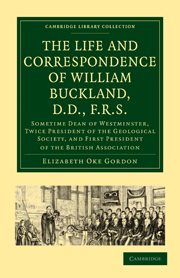 The Life and Correspondence of William Buckland, D.D., F.R.S.
The Life and Correspondence of William Buckland, D.D., F.R.S. Published online by Cambridge University Press: 05 November 2011
The century now drawing to a close is remarkable beyond all others for the spirit of inquiry into the physical constitution of the earth, into the forces playing upon its surface, and into the phenomena of life, both plant and animal. The rise of the natural sciences in the modern sense may be said to date from its beginning. In this great renascence geology has borne an important part. It has opened out new and almost endless avenues of thought, giving us, on the one hand, the history of the ever-changing earth, from the remote time when it was sufficiently cool to allow of water resting upon its surface, and, on the other, the long and orderly procession of animal life beginning with the lowest invertebrate forms and ending in Man. In this latter connection it enabled Darwin to grasp the principle of evolution that now influences our view of life as a whole in the same way as the law of gravitation has affected our view of matter, not only in the earth, but also in the universe. To us, living at the end of the century, it is difficult to realise the conditions under which the pioneers lived and worked, because through their labours the conditions have wholly changed. In this short Life of Dr. Buckland, written under considerable difficulty and nearly four decades after his death, we are brought face to face with the old order of things, and we can realise how great is the evolution that has taken place since his time.
To save this book to your Kindle, first ensure [email protected] is added to your Approved Personal Document E-mail List under your Personal Document Settings on the Manage Your Content and Devices page of your Amazon account. Then enter the ‘name’ part of your Kindle email address below. Find out more about saving to your Kindle.
Note you can select to save to either the @free.kindle.com or @kindle.com variations. ‘@free.kindle.com’ emails are free but can only be saved to your device when it is connected to wi-fi. ‘@kindle.com’ emails can be delivered even when you are not connected to wi-fi, but note that service fees apply.
Find out more about the Kindle Personal Document Service.
To save content items to your account, please confirm that you agree to abide by our usage policies. If this is the first time you use this feature, you will be asked to authorise Cambridge Core to connect with your account. Find out more about saving content to Dropbox.
To save content items to your account, please confirm that you agree to abide by our usage policies. If this is the first time you use this feature, you will be asked to authorise Cambridge Core to connect with your account. Find out more about saving content to Google Drive.